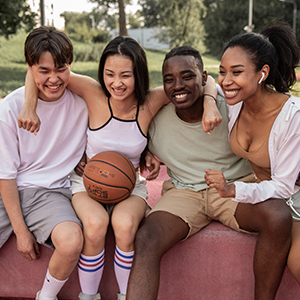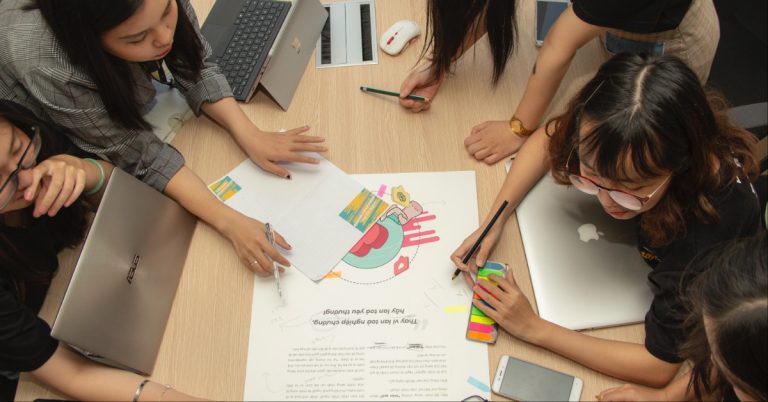Bearing in mind that extracurricular activities have a positive effect on personality development in different areas of life (through providing moral compass, contributing to emotional maturity, intellectual development, raising the awareness of the importance of social responsibility), educational institutions and the teachers themselves strive to encourage students to consider the potential activities that would reflect their talents and interests.
We are going to discuss the concept of extracurricular activities, their background and their most characteristic types; we will see which activities are taken into consideration and especially valued when assessing a college application, and look into some ways to find extracurricular activities that interest and motivate you, if you have not discovered them already.
Meaning and definition of extracurricular activities
A general explanation of the meaning of the term extracurricular activities (ECA) (often also co-curricular activities (CCA), extra academic activity (EAA), after-school activities, extraclassroom activities) is that it refers to students’ additional individual and group activities that take place outside the regular school or faculty curriculum, which, through regular practicing, helps the students to develop different aspects of their personalities, from social intelligence to concrete skills that can, but do not have to be related to school activities.
Although there is a wide range of definitions that describe extracurricular activities, we are going to list two by relevant sources, institutions and authors, to provide a better insight into what this term refers to, precisely.
According to the International Institute for Educational Planning (UNESCO), extracurricular activities constitute: “A range of activities organized outside of the regular school day, curriculum or course intended to meet learners’ interests. These activities can help learners become more involved in their school or community and can help them to develop social and soft skills and to promote wellbeing. These activities can include athletics, sport, voluntary work, photography, drama, music, etc. In some countries, this is also referred to as ‘co-curricular activities’.”
Academic papers on the subject of co-curricular activities also deal with the influence, i.e. importance of co-curricular activities when it comes to the student’s academic performance. In the spirit of these papers, the definition can be as follows: “These are the activities that students participate in during the normal school day. These can include sports, band, chorus, or any other 9 activities that take place during the normal school day. These activities do not require the student to put in extra time after the normal school day.” (Frame, R. (2007). Developing Character and Values Through Co-Curricular Activities)
The history of extracurricular activities
Extracurricular activities emerged in the USA in the 19th century, as an addition to the regular curriculum, primarily directed towards practical interests, and not much later, professional ones. Namely, the first extra academic activities emerged around 150 years ago at well-known universities such as Harvard and Yale, through literary clubs specialized in debate training. These clubs emerged concurrent with fraternities and sororities, whose early form dates back to ancient Greece.
It is worth noting that the first athletic clubs also emerged in the USA, which is not surprising considering that sports participation is still highly valued when it comes to college enrollment. As technology developed with industrialization, new clubs gradually emerged in journalism in publishing, during World War One (Casinger, J. (2011). College extracurricular activities: the history of activities). Looking back, we can perceive the importance of these clubs, whose usefulness led to the introduction of a wide range of extracurricular activities in primary schools and high schools across the USA.
The role of ECA in a student’s life
Participation in extracurricular activities was often questioned because of the assumption that they might “meddle” and change the primary purpose of education. However, as Hall, Hord, Rutherford and Hulling (Hall, G.e. , W.L. Rutherford, S.M. Hord, and L.L. Huling (1984) “Effects of three principal styles on school improvement”) put it, co/extracurriculum activities perhaps actually keep students in school, exactly because of the wide range of possibilities and opportunities that they bring about, which is why the obviously unsubstantiated skeptical views of critics ought to be reassessed.
Therefore, we can assume that one of the main reasons for the perseverance of extracurricular activities at schools is their function of building upon the knowledge and skills the learner is interested in, but cannot find in the regular curriculum in the classroom. The role of ECAs is mostly practical, as they create applicable knowledge that can later serve as a valuable addition when students apply for college or work. On the other hand, we cannot leave out the role of extracurricular activities in the forming of an individual’s full personality, as a result of being exposed to new activities, and in socialization, which is becoming increasingly important, taking into account the fact that alienation and depression are becoming more widespread among the young people in the 21st century.
Why are extracurriculars important and what are their benefits?
Considering that almost one in four students is a member of an academic club (Sadker, M.D., & Zittleman, K. (2010). Teachers, schools, and society (9th ed., pp. 189-190). McGraw Hill Higher Education) and that over 80% of young people are involved in some sort of extracurricular activities (Fredricks, J. A. (2011). Extracurricular participation and academic outcomes: Testing the overscheduling hypothesis. Journal of Youth and Adolescence) it is intuitive to assume that it is very important that the child should become involved in an activity available at their school. Rather than just believing that it is important for a young person to become involved in an extra academic activity, you can check out the following list of the crucial reasons:
- Maintaining physical and mental health – We all know that body and mind are closely connected and that any instability in any of these areas can prevent the student from realizing their full potential. Therefore, practicing an extracurricular activity that the student loves and perceives as a hobby can contribute much towards relieving the stress accumulated while performing academic tasks. Also, participation in extracurricular sports activities (gymnastics, volleyball, athletics, etc.) leads to the secretion of hormones that can improve the mood (endorphin, dopamine, adrenaline, etc.).
- Supplemented education – We would not like to generalize, but in most cases, the classroom and the curriculum lean towards theoretical knowledge, which serves as the foundation of all knowledge. Through adding extracurricular activities related to a certain subject (for instance, in a math club), the student can acquire adequate education that will not require long periods of studying outside the school.
- Experiential learning – It has turned out that students who attend extra academic activities that require some form of cognitive learning have a higher percentage of attendance and engagement in class, which, in turn, can serve as a sound foundation for handling the obligations that await them in higher education.
- Forming of moral compass and cultural value system – Children who participate in after-school activities often encounter children with entirely different backgrounds (social status, culture, religion). Through the regular attendance of these activities, the children have a chance to get to know each other and see how few their differences are, and how much more pronounced and frequent the values that bring them together are.
- Enhances personality development – In addition to a wide range of concrete and auxiliary skills that are acquired while performing any extracurricular activity (explained in the segment entitled Benefits), there are a number of additional factors that positively affect the development of the student’s personality. Namely, when attending any extracurricular activity, students are regularly compelled to leave their comfort zone in order to communicate with peers and present their ideas and opinions, which results in the forming of a healthy personality who can accept themself and interact normally in social situations.
Benefits of participation in extra academic activities
If you have read the paragraphs above, now you have a decent big picture of what extracurricular activities mean, as well as of their role and their importance for the students. However, more remains to be said about the concrete benefits of participation in extra academic activities that directly affect the degree of success in life or academic endeavors. Here are some crucial benefits of extracurricular activities:
New skills learned
Perhaps the most obvious benefit of students’ participation in extracurricular activities is the acquisition of new skills. Namely, new skills do not necessarily have to be connected to the subjects studied at school – they can be a part of a larger goal the student has set for themself regarding future career, or an extension of a hobby (yoga, reading) that can contribute to the development of soft skills.
Improved academic performance
When people think of extracurricular activities, sometimes the first thing that comes to mind is time invested into something that does not directly unburden them from their school obligations. However, extensive research on this subject has repeatedly proven that children who attend extracurricular activities in fact improve their general academic performance.
Many might ask how come that the students’ academic performance improves when they have less time available for studying and doing school assignments? The answer lies in the mental fulfillment that the student gains during and after the extracurricular activity. Namely, when students do something they are passionate about, their brain functions improve, which, in turn, enhances their time management and lets them spend the time dedicated to studying more productively.
Developing time management skills
Like we have said when we were explaining the previous benefit, students who attend extracurricular activities often have less time for studying and other activities outside of school, which compels them to make better use of the rest of their free time. After some time, students who encounter time constrictions on a daily basis develop time management as a permanent skill that will stay with them after their time at school and enable them for a better quality of life, with fewer unforeseen stressors.
Helping students get into better universities
If you would like to attend an Ivy League school or a highly ranked college, you need to bear in mind that getting accepted into one is next to impossible without a history of extracurricular activities. There is no publicly available data on the exact weight that extracurricular activities carry when college applications are considered, but we know for sure that their evaluation varies from one department to another, and from one college to another. But if your SAT/ACT result and your GPA are similar to that of someone else applying for the same field, your portfolio containing extracurricular activities related to the department you are applying for will ensure that you are selected over other candidates.
For instance, if you are applying for acting studies, it is highly desirable that you have taken part in a drama club; likewise, if you are applying for social sciences, it would be good to have participated in extracurricular activities that suggest a developed leadership skill, such as student parliament, volunteering, community service or fundraising. In the last segment of this article, we will discuss which extracurricular activities are especially valued when it comes to college applications in some more detail.
Networking opportunities
Hanging out with peers is an integral part of any extracurricular activity. Therefore, as the child is a part of a group, they have an opportunity to develop closer friendships that can extend outside of the after-school activities. Through making strong, wholesome friendships, children create strong interpersonal social networks that can, further on, provide support and recommendations when it comes to college or job opportunities.
Types of extracurricular activities
Since no two students have the exact same set of interests, there is a wide range of extracurricular activities available in the USA today. In this paragraph, we are going to list the most characteristic types (categories) of extracurricular activities, and what each of them implies. Please note that all these types and individual activities are not available in all schools.
Sports
Sports are the most widespread type of extracurricular activities in the United States. Besides being conducive to the healthy development of the body, sport requires students to invest a lot of effort and energy into training in order to achieve the best possible results in competitions. It should also be noted that the fundamental skills that experience in sports brings along include teamwork, reliability and a developed competitive spirit. Students who manage to achieve notable success in sports on state or federal level during high school have considerably better chances when it comes to getting accepted at prestigious colleges. Some of the most popular sports in educational institutions are:
- Football
- Basketball
- Athletics
- Baseball
- Volleyball
- Gymnastics
- Swimming
- Wrestling
- Cycling
- Judo
- and many other sports.
Performing arts
Young people who dream of becoming professional actors, musicians, singers, comedians, dancers or some other kind of performers often opt for extracurricular activities in performing arts. Children who choose this type of extracurricular activities develop their skills more quickly when it comes to articulating their emotions and public speaking, and also develop self-confidence more quickly, as a consequence of frequently performing in front of their peers or grown-ups. There are two major performing arts subcategories of extracurricular activities:
- Music (Solo Music, Orchestra, Own Musical Band, Singing Lessons, Concert Band, Church Choir, School Choir etc.)
- Drama (Choreography, Theater, Drama Club, Filmmaking, Musical Theater, Puppetry, Standup Comedy, Playwriting and many others)
Academic clubs
This type of extracurricular activities is often the choice of children who are very good at some of the subjects at school. Academic clubs often deepen a student’s interest in an area and inspire them to shine with their full intellectual potential. Among other competitions, the members of an academic club can compete at the Science Olympiad. By winning any prestigious award in the area you are applying for can be a huge stepping stone for your education and later professional career. Let us list some clubs that let students participate in extracurricular activities closely related to school subjects:
- Math Club
- Chemistry Club
- Biology Club
- Physics Club
- Robotics Club
- Coding Club
- History Club
- Literature Club
- Creative Writing Club
- Poetry Club
- Literary Magazine Club
- English Club
- Psychology Club
- Architecture Club
- and many others
Student government
This is the most common type of extracurricular activities in educational institutions, but it does not involve very many students. The students who are interested in representing other students through policy interfacing with educational administrative organs can opt for activities within the framework of student government. Those who get involved in this extracurricular activity can develop organizational skills, as well as social and communication skills. The activities involved in the student government context include the planning of events that are in the students; interest, redirecting funds to other, smaller organizations and maintaining a strong student community.
Social activism
Students who have a strong sense of responsibility towards the society, the environment, and towards those in need of help often choose activities from the realm of social activism. Social activism encompasses a truly wide range of activities, including volunteering, fundraising, community service, political activism (the fight for the preservation of the environment, animal rights, end to discrimination) and many other outlets. Young people with a lot of experience in these extracurricular activities often develop strong leadership skills, proactivity, as well as an entrepreneurial spirit, which can all be of great importance long-term, during higher education as well as in life in general.
Visual arts
Extracurricular activities filed under visual arts are the choice of students who have a talent of creating visual artifacts and content. The most common activities of this type are:
- Painting
- Calligraphy
- Photography
- Pottery
- Sculpture
- Filmmaking
- Video Production
Affinity groups
Those who have a great desire for, and sense of, belonging to a group that shares a common identity and values choose affinity groups. These groups can encompass any company of people gathered based on their:
- Interests
- Political opinions
- Ethnic or national identity
- Religious affiliation
- Sexual identity
Other activities (hobbies)
It can be said that pretty much any extracurricular activity used to be just a hobby, but even today, there are still hobbies whose place is not concretely defined in any of the types. People who rely more on their own selves and their own pace often choose hobbies that are often not available in the majority of educational institutions. The most characteristic hobbies, i.e., activities that do not belong to any of the types listed above, but are still viewed as extracurricular activities, are:
Best extracurriculars for college
Believe it or not, most college admission officials prefer students who are versatile to those who are not. Therefore, a quality ECA portfolio can ensure that you are a step ahead of those who have a similar GPA and SAT/ACT score, but a rather modest experience in participating in extracurricular activities. So, like we said when we were listing the benefits, the exact appreciation of extracurricular activities can vary from one faculty to another and even between departments. Some will value sports engagement more, while some will place emphasis on the participation in academic clubs.
As we continue, we are going to list the best general co-curricular activities (that often include several types of activities) which are bound to be appreciated in almost any college.
Creative pursuit
In the world that places an increasing pressure on young people to be quite specialized, we are facing the reality where students who apply to college are increasingly “more alike than different”. This is why it is very important to enhance the concrete extracurricular activity relevant for the department you are applying for with other activities that will add some extra color to your life story. You are not expected to be all over the place and force yourself to choose areas that have no direct connection to your main area of interest just to gain the approval of the administration, but you do need to show talents and natural curiosity that so easily gets suffocated by excessive school obligations and expectations imposed by the society.
Therefore, let’s say that you are applying for a technical college – it would be quite authentic if you also liked to paint or write poetry or engage in another kind of creative writing. This is just one possible example among an unlimited number of combinations, and it’s up to you to pinpoint two “opposite” sides each of us has. Only sincere participation in the extracurricular activities that really interest you will enable you to show that your search for self-fulfillment and self-realization is authentic and creative.
Sports/athletic participation
In this particular case, when we talk about the participation in sports activities, we do not necessarily place the emphasis on the student’s physical abilities or their concrete results achieved in competitions (which are, of course, always a plus). Namely, when considering an application by a student involved in sports, the universities often take into consideration their dedication and how much of a team player they have proven to be.
These two characteristics often speak a lot about somebody’s personality, which is a very important aspect for any college, as everyone wants only decent, representative students who will uphold the reputation of the educational institution even after the completion of studies and their sports career.
Leadership activities
Among the most important activities that are considered with students’ applications are perhaps the extracurricular activities that encourage leadership in young people and allow it to shine through. Leadership as a skill and a characteristic has never been more needed than in the 21st century, full of unexpected changes. It is sensible to ask what positions in extracurricular activities suggest some sort of leadership experience.
For instance, you might be the captain of a sports team, the president of a student organization or a student community leader (i.e., you have some sort of responsibility towards your peers), a volunteer organizer of a social campaign, political protest or a fundraiser for a person or community in need. The main point of these activities is not to demonstrate the student’s organizational skills, but to note their initiative and self-confidence in responsible leadership within a group.
Specific work experience and internships
If you were lucky to find a concrete thing you like while you were in high school and also had a corresponding opportunity to engage in an internship, part-time or full-time job, you are on the right track towards providing yourself with improved odds of getting accepted into the desired college compared to other applicants. Therefore, bearing in mind that most students find themselves while they are already attending a higher education institution, and only later gain direct insight into what an internship or an actual job in the field in question is like, rest assured that you are on the right track if your mini-portfolio boasts this kind of extracurricular activity.
How to find extracurricular activities that suit you?
The variety of lists of extracurricular activities lists and trends that vary from one area to another, it is easy for a young person to lose the bearings in search of those that suit them best. This is why we have decided to offer some advice regarding the steps you might take to narrow down your list of interests and clearly point out if a certain extracurricular activity is right for you or not.







